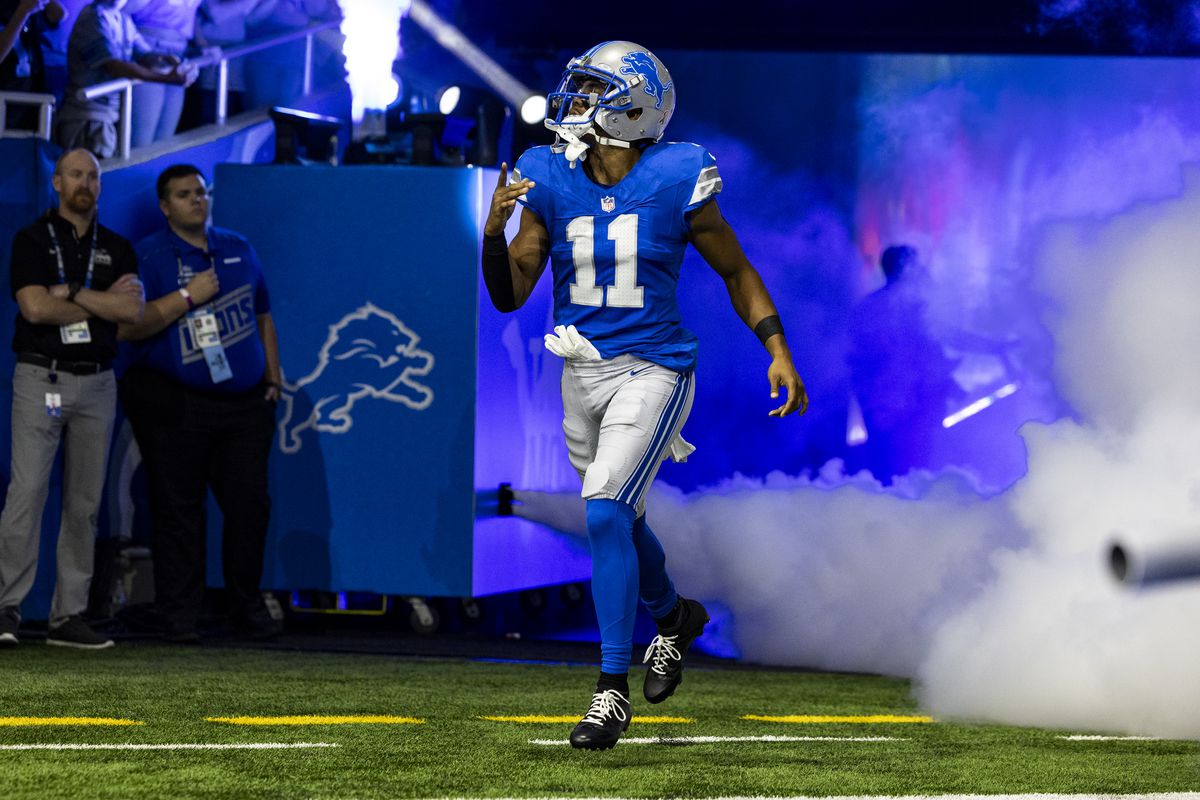Kalif Raymond, a key contributor to the Detroit Lions’ offense and special teams, has become a focal point of the team’s financial strategy as they maneuver through the intricacies of salary cap management. In the world of the NFL, managing the salary cap is as much about strategy and foresight as it is about player performance. The Lions’ decision to adjust Kalif Raymond’s contract in a way that removes a 2026 cap hit, while simultaneously doubling his guarantees for 2025, reflects the delicate balance teams must strike between fielding a competitive team and ensuring long-term financial stability. This move, while seemingly straightforward, is a microcosm of the complex financial landscape that the NFL operates within.
Kalif Raymond’s Role and Impact on the Detroit Lions
Before delving into the specifics of the cap hit restructuring, it’s essential to understand Kalif Raymond’s role within the Lions organization. Raymond, a wide receiver and return specialist, has been a steady contributor to the Lions’ offense since joining the team. His speed, agility, and ability to make explosive plays on special teams have earned him a respected role, particularly as a deep threat in the receiving corps. Though not necessarily a top-tier wide receiver in terms of overall production, his contributions are invaluable in creating mismatches and stretching the field. Moreover, his prowess as a return man has been critical in flipping the field position for the Lions, making him an asset beyond just his offensive snaps.
Raymond’s ability to perform in multiple facets of the game gives the Lions flexibility in how they use him, whether it be on offense, special teams, or in critical situations. He is not only a skilled wide receiver but a leader in the locker room and a reliable presence when the Lions need a playmaker.
The NFL Salary Cap and Team Financial Strategy
In the NFL, each team is bound by a salary cap, which limits the amount of money that can be spent on player salaries for a given season. This cap is designed to maintain competitive balance across the league, ensuring that wealthier teams do not outspend smaller-market teams to accumulate top-tier talent. The cap is not static; it fluctuates based on league revenue, and it often requires teams to make difficult decisions regarding which players to keep and which to let go.
Teams must navigate a complex set of rules and strategies when it comes to managing their cap space. Players’ contracts are often structured with base salaries, bonuses, signing bonuses, and guaranteed money. The aim is to create flexibility in the short term while ensuring that long-term financial obligations do not hinder the team’s ability to operate within the cap.
For a team like the Detroit Lions, which has seen a recent resurgence in terms of performance, making cap space adjustments is crucial. The Lions must balance maintaining their core roster, especially players like quarterback Jared Goff, defensive playmakers like Aidan Hutchinson, and offensive weapons like Raymond, while positioning themselves for sustained success in the coming years.
Kalif Raymond’s Contract Reworking: 2025 Guarantees and 2026 Cap Hit
The decision to adjust Kalif Raymond’s contract in this manner is rooted in a desire to achieve financial flexibility while also rewarding Raymond for his contributions to the team. By removing the 2026 cap hit, the Lions are essentially creating more room for other future acquisitions or re-signing key players. This move could allow the Lions to stay competitive in future seasons, particularly as they begin to focus on ensuring long-term sustainability and potential playoff contention.
Doubling Raymond’s 2025 Guarantees
The most significant aspect of this restructuring is the decision to double Kalif Raymond’s guarantees for the 2025 season. Guarantees are a critical element of NFL contracts because they provide players with financial security, even if the team decides to move on from them in the future. These guarantees often come in the form of signing bonuses or fully guaranteed base salaries, and they represent money that the team has committed to paying regardless of a player’s future performance or health status.
For Raymond, doubling his guarantees in 2025 signifies a recognition of his value to the team. From the Lions’ perspective, it’s a way to lock in Raymond’s services for the short term, giving him increased security while also ensuring he remains committed to the team. For Raymond, this contract restructuring provides a financial safety net in the form of guaranteed money, making it more difficult for the team to release him without significant financial implications. It also reflects his increasing importance to the Lions as they look to build a competitive team in the upcoming seasons.
Additionally, doubling Raymond’s 2025 guarantees aligns with a broader trend in the NFL, where teams are more frequently front-loading contracts or creating structures that offer immediate rewards to players. This trend is often seen as a way to incentivize players to perform at a high level in the short term while also providing them with peace of mind about their future earnings.
Removing the 2026 Cap Hit
The other part of the equation is removing Raymond’s 2026 cap hit. For teams working within the constraints of the salary cap, deferring money to future years or eliminating cap hits is a common strategy to clear space for immediate needs, such as signing free agents or extending contracts for other core players. By removing the 2026 cap hit, the Lions are effectively pushing money into future seasons, where they may have more flexibility to handle larger contract obligations or make adjustments based on the team’s performance and evolving needs.
In this instance, removing the 2026 cap hit could serve several purposes. First, it may provide the Lions with an immediate cap relief that they can use for other player signings, contract extensions, or to ensure that they can absorb any unforeseen roster changes. This move might also reflect the Lions’ intent to make a push for a Super Bowl or playoff contention in the near future, making it a prudent move to free up resources for more immediate needs.
The Strategic Importance of the Move
The restructuring of Kalif Raymond’s contract is an indication of the Lions’ broader financial strategy. As the NFL becomes increasingly focused on maintaining competitive balance while managing financial flexibility, the ability to adjust contracts and cap hits becomes a critical tool for team executives. The Lions have clearly identified that in order to continue competing at a high level, they must manage their cap effectively while rewarding players who contribute significantly to the team.
In Raymond’s case, the restructure allows the Lions to invest in a player who may not be one of the highest-paid on the roster but whose contributions are significant to the team’s success. It also reflects the Lions’ recognition of the importance of depth and versatility in their roster. By ensuring that players like Raymond are financially secure and motivated to continue performing at a high level, the Lions are positioning themselves for long-term success without sacrificing flexibility.
Furthermore, the decision to adjust Raymond’s contract might also indicate a desire to lock in a productive core of players who will be integral to the Lions’ plans for the 2025 season and beyond. With the increased guarantees, Raymond is less likely to be released in the immediate future, allowing the Lions to focus on building a cohesive and stable roster for the coming years.
A Thoughtful and Strategic Move
Kalif Raymond’s contract restructuring—doubling his 2025 guarantees while removing the 2026 cap hit—illustrates the Lions’ commitment to managing their roster and salary cap in a way that balances short-term flexibility with long-term success. It’s a reflection of the broader challenges faced by NFL teams in managing their finances while trying to build a competitive roster. Raymond’s enhanced guarantees ensure that he remains a central figure for the Lions in the coming years, while the cap hit removal clears space for future opportunities.
As the Lions continue to build a competitive and sustainable team, managing players’ contracts with a keen understanding of both the financial and on-field impacts will be essential. The decision to restructure Raymond’s contract is a calculated move that could pay dividends as the team looks to remain competitive in the coming seasons, with both immediate cap relief and continued stability for key contributors like Raymond.



